Meet Jihoon, a self-taught tattoo artist mastering Asian ornamental and large-scale blackwork. He interprets tattoos as a form of armor and protection – each piece carefully conceptualised to frame the identity and body of the client. With over 8 years of experience, Jihoon started his career in Berlin and is now based at Light House Professional Tattoo in Seoul, South Korea. In this interview, he reflects on his understanding of tattooing, international experiences, and visions for the future.
How would you like to introduce yourself?
My name is Jihoon, and I’ve been tattooing for 8 years. I started my career in Berlin, Germany, and I’m currently based in Seoul, South Korea.
Where can your customers find you? (Please specify a city and studio.)
I’m based in Seoul, South Korea, and you can find me at Light House Professional Tattoo.
How would you describe the tattoo scene in Korea these days?
I’m still quite new to the Korean tattoo scene, since I only moved back here last year!
How would you define yourself in one word?
Passionate.
Where did your fascination for tattoos come from?
I remember the moment I stepped into a tattoo studio to get my first tattoo. My first impression was, “This could be my dream job.”
What does tattooing mean to you personally?
To me, tattooing feels like armor, like a form of protection.
At what point in your life did you decide to become a professional tattoo artist?
I moved to Berlin to study industrial design, but at some point, I realized college wasn’t for me. Around that time, I became really interested in tattoos, so I just started practising at home.
How did your family react when you started a career in tattooing?
My father didn’t know for about 4 years. By the time I told him, I was already established in the tattoo business, so he just accepted it.
Did you go through an apprenticeship? How was that experience?
No, I am a self-taught tattoo artist!
What did your first tattoo look like?
It was a jet fighter on my forearm!
Do you usually do guest spots? If yes, what’s your experience in doing them?
Yes, I’ve done many guest spots while I was living in Germany, mainly across different European countries.
As a tattoo artist, what does your daily working routine look like?
I usually tattoo about three days a week. On tattoo days, I typically work from 12 to 6 pm. When I’m at home, I spend time working on designs, replying to emails, and creating personal artwork.
What is one surprising aspect of being a tattoo artist?
Building personal connections with my clients, many of them have actually become good friends of mine!
How do you determine the price of a tattoo?
It depends on the location, different cities and countries. I usually charge for a full-day session, which is about 6–7 hours of work.
What’s the most challenging aspect of being a tattoo artist in 2025?
As the global market has slowed down, the biggest challenge is making my style stand out and remain unique.
What’s the most rewarding aspect of being a tattoo artist?
Freedom!
What tools and machines do you prefer to use?
I’m a big fan of DK machines, but lately I’ve been using the FK Irons wireless machine. FK Irons is also one of the best tattoo machine manufacturers in the industry.
What’s your number one aftercare advice for clients?
Since I do heavy black work, I recommend keeping the fresh tattoo dry for the first two days so that the bleeding stops more quickly.
How would you define your current tattoo style, and how did you end up focusing on it?
My style is Asian ornamental tattoo. While working as a resident artist at Der Grimm Tattoo, I had many opportunities to learn and become familiar with large-scale blackwork tattoos, which naturally led me to focus on this style.
Please walk us through your process when you start a new tattoo for your customers.
Clients submit a booking form through my website. I send them information by email, discuss the design and price, and collect a deposit to secure the booking.
How do you stay creatively inspired?
I try to visit museums regularly and go through books to find references. When I have many appointments, it can be hard to stay creative. So, I sometimes take short breaks from tattooing, which really helps me refresh, gain new inspiration, and feel motivated to create again.
How do you balance client requests with your artistic vision?
Most of my clients already know and appreciate my style, so balancing their requests with my vision is not too difficult. I usually provide two or three draft sketches with different concepts, giving clients diverse options to choose from from the very beginning.
Are there any tattoo styles you’d like to explore more?
Body suits.
What’s the most underrated tattoo style?
Probably Japanese Traditional.
What’s the most overrated tattoo style?
Neo tribal.
Are there any tattoos you prefer not to do?
Skull tattoos! I sometimes get requests for them, but honestly, I’m just not very good at it.
Do you have sponsors? If yes, what could you tell us about your sponsors?
Yes, I’m sponsored by Eclipse Tattoo Ink from Spain. It is really good for blackwork, especially heavy black work. I highly recommend to try it!
As a tattoo artist, what kind of tattoo ethics is really important to you?
Never copy another artist’s work! We all get inspired by each other, but it’s important to create something unique that is truly your own.
Being a successful tattoo artist requires many different skills. What’s your favorite way to keep learning?
Don’t be arrogant. Share your knowledge with others. When you do, they will often share their knowledge with you as well. Staying connected and engaged with other artists is the best way to learn and keep improving.
Do you like to teach or mentor upcoming artists?
Not yet! But I do want to create some educational content for my Instagram, so people without mentors or teachers can also learn and benefit from it.
What’s the best piece of advice you ever received to improve your tattooing technique?
Take your time and focus on quality. Since money is usually involved in tattooing, there’s often time pressure. Be clear about the price upfront, and even if the session takes longer than expected, don’t charge extra. That way, both the artist and the client avoid stress about money, and you can focus fully on the quality of the work.
How do you stay at the top of your game?
By staying passionate and motivated. Consistency is always the key.
What do you think separates a good tattoo artist from a great one?
A good tattoo artist knows the craft, but a great one is constantly pushing boundaries. Always learning, experimenting, and growing. Passion and dedication are what make the difference.
How do you feel about the growing acceptance of tattoos in society?
I think it’s a very positive change. Tattoos have long been misunderstood in many cultures, but now people see them more as a form of art and self-expression. It allows artists like me to share our work with a wider audience and for clients to wear their stories with pride.
What’s the biggest misconception that customers may have about tattoos?
I think one of the biggest misconceptions is that tattoos always need to carry a profound meaning. Of course, meaning is important, but trying too hard to force too many elements into a design for the sake of symbolism can actually ruin it. I believe a tattoo should first look strong and beautiful as an artwork on its own.
What’s the biggest trend in tattooing you have noticed in the last 5 years?
Definitely fine line and micro-realism tattoos. It’s not the style I personally specialize in, but I think it’s absolutely fantastic to see how much it has grown.
What’s your view on the rise of AI in tattooing?
I think we should all learn how to use AI effectively. There’s no reason to reject new technology. It can be a great tool if used with creativity and balance.
What would you change about the tattoo industry?
I would change the way tattoos are still treated as “underground” in some countries. After working in Europe, where tattoos are more openly accepted, I realized how important it is to recognize tattooing as an art form. I hope the industry moves toward more openness and respect so that artists can focus entirely on creativity without unnecessary restrictions.
Do you work on other projects within the tattoo industry?
Educational content such as online apprenticeship!
Do you do other forms of art besides tattooing?
I make digital paintings. I would like to try physical paintings too in the near future!
Who are the people you admire the most within the tattoo community?
Gakkin, Nissaco.
What’s your experience at tattoo conventions so far?
I haven’t participated in any tattoo conventions yet, but there’s an upcoming event in Korea, the Korea Tattoo Convention. I’m hoping to take part in the competition and maybe even win a prize!
What’s your primary reason to attend a tattoo convention?
To win awards and promote myself!
Is there any tattoo that you have created in your career that you are particularly proud of?
Absolutely! I’ve done full sleeves on both legs.
What is your greatest accomplishment as a tattoo artist?
Working at Der Grimm Tattoo, one of the greatest tattoo studios in the world! It’s well-known in the European tattoo scene for its incredible black work. The experience was amazing for me, and I’m very proud of having been part of it.
What advice would you offer to someone considering a career as a tattoo artist?
Take it seriously and try to gain experience at as many different tattoo studios as possible. I once heard someone say that a tattoo artist is like a pirate – take the opportunity to travel, meet new people, and learn as much as you can along the way!
What are your goals or dreams for the near future?
I want to focus on larger-scale tattoos, more like full bodysuits, and eventually open my own private studio and showroom somewhere in the world.
What legacy do you want to leave as a tattoo artist?
“Armor for the human body” is the slogan of my tattoo work. I’d like to develop the concept of armor through tattoos, and hopefully, it will grow into a recognized genre that people pursue in the future.
To close this awesome interview, what’s your last message to our readers?
Thank you for giving me this opportunity and for reading the interview. I hope you all enjoyed it and felt inspired!

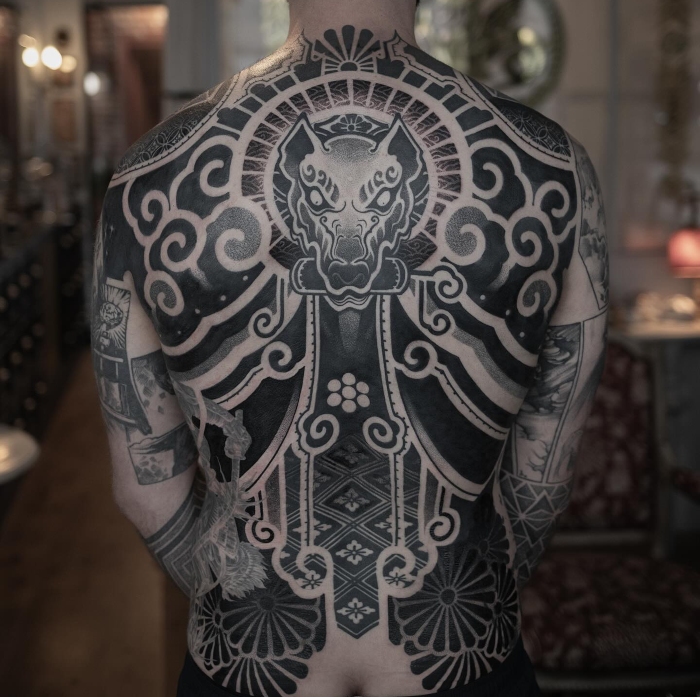
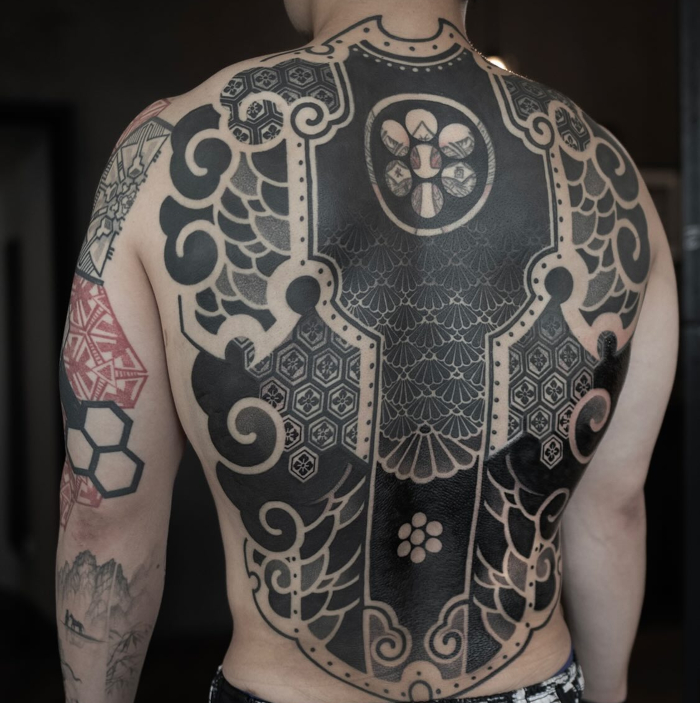






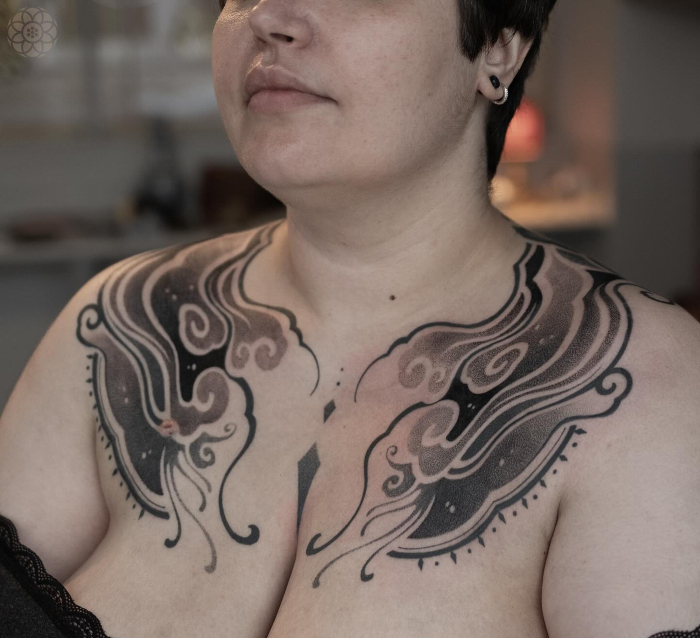

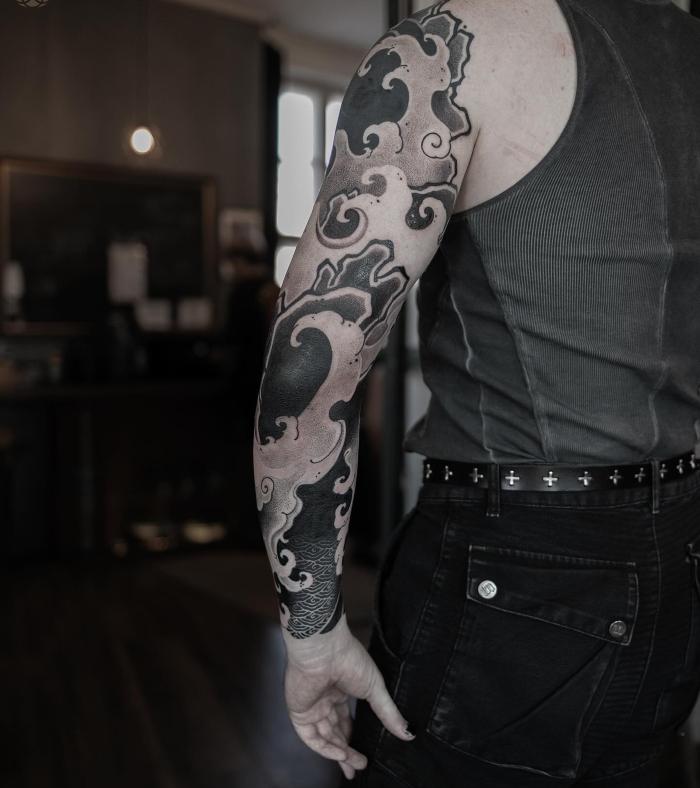




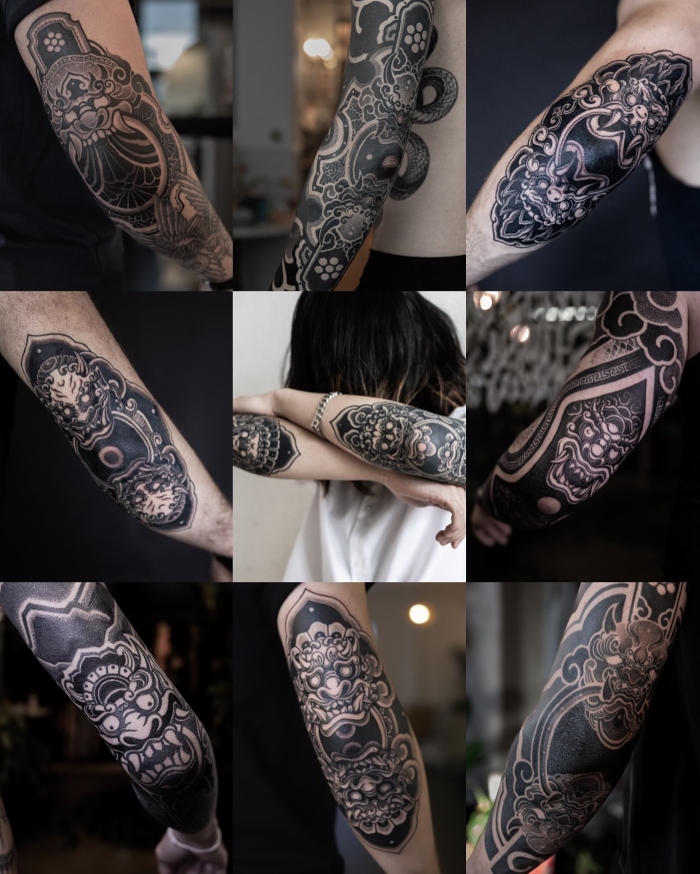


Leave A Comment